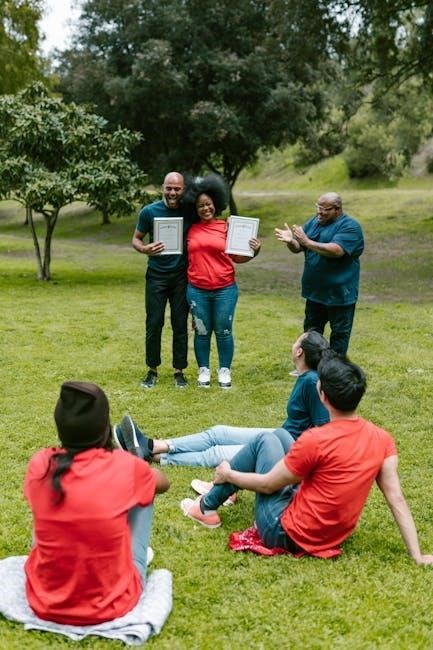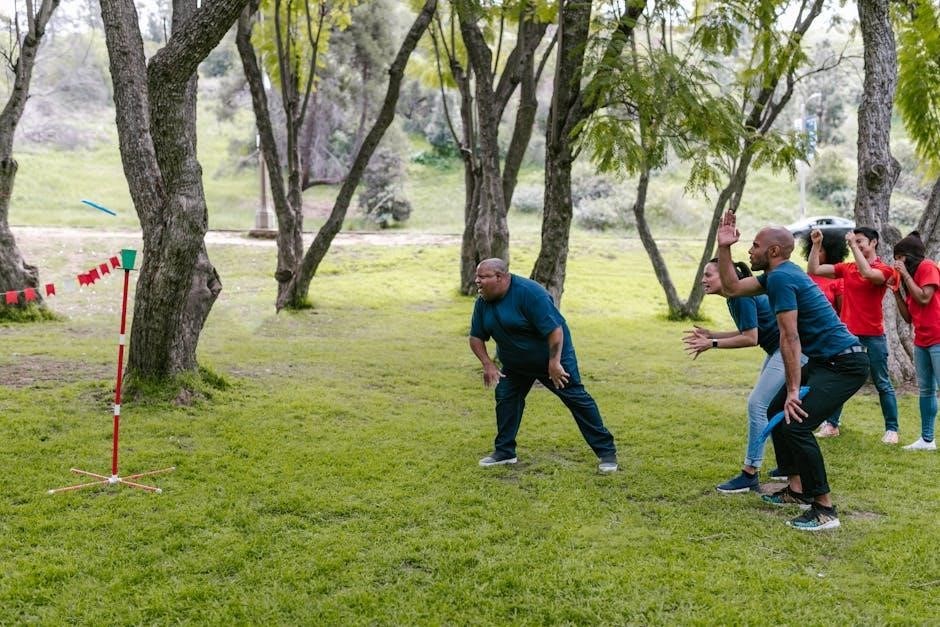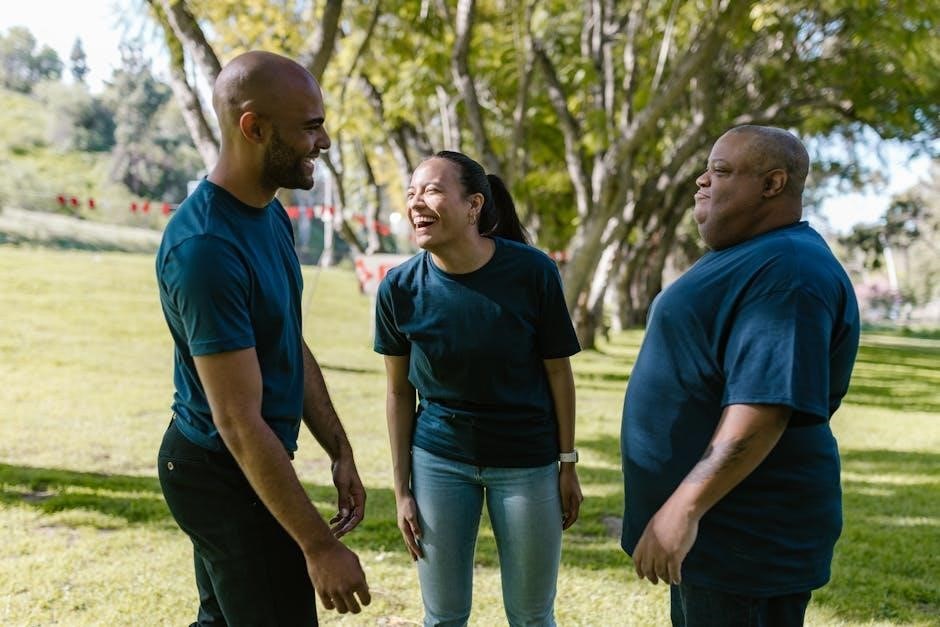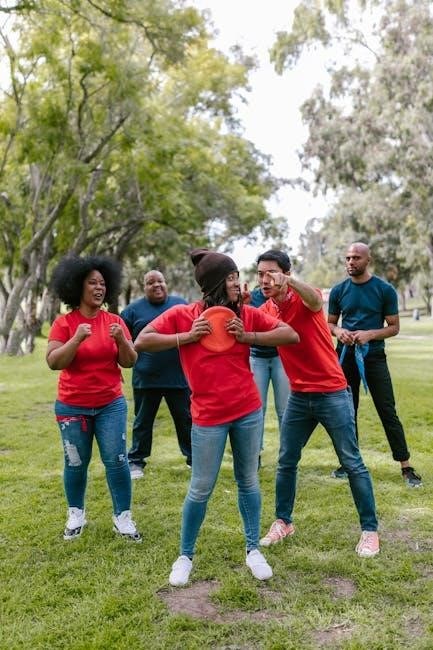
Leadership training activities are essential for developing key skills like communication‚ decision-making‚ and emotional intelligence. PDF resources offer structured exercises‚ templates‚ and handouts for effective learning.
1.1 Understanding the Importance of Leadership Development
Leadership development is crucial for fostering growth‚ collaboration‚ and innovation within individuals and teams. It enhances communication‚ decision-making‚ and emotional intelligence‚ equipping leaders to navigate challenges effectively. PDF resources provide comprehensive guides‚ templates‚ and activities to cultivate these skills. By investing in leadership development‚ organizations build resilient‚ adaptive‚ and inspiring leaders who drive success and positive change. Effective training activities ensure leaders are prepared to motivate‚ empower‚ and guide their teams toward achieving shared goals and fostering sustainable growth;
1.2 Overview of Leadership Training Activities
Leadership training activities encompass a wide range of exercises designed to build essential skills like communication‚ decision-making‚ and emotional intelligence. These activities‚ often detailed in PDF guides‚ include individual and group exercises‚ experiential learning‚ and interactive games. They aim to foster collaboration‚ problem-solving‚ and self-awareness while promoting personal and professional growth. From icebreakers to advanced team challenges‚ these activities are tailored to diverse audiences‚ ensuring leaders develop the tools needed to inspire and guide effectively. PDF resources provide structured templates and handouts for seamless implementation.
Types of Leadership Training Activities
Leadership training activities are categorized into individual and team-based exercises‚ focusing on skill development through practical tasks‚ discussions‚ and experiential learning‚ as detailed in PDF guides.
2.1 Individual Leadership Development Activities
Individual leadership development activities focus on personal growth‚ self-awareness‚ and skill enhancement. These include reflection exercises‚ goal setting‚ and self-assessment tools. PDF guides offer templates for creating personalized development plans‚ helping individuals identify strengths and areas for improvement. Activities like journaling and vision boarding encourage introspection‚ while time management and decision-making exercises build practical skills. These individualized approaches ensure participants can work at their own pace‚ fostering a deeper understanding of their leadership potential and how to realize it effectively.
2.2 Team-Based Leadership Training Exercises
Team-based leadership exercises foster collaboration‚ communication‚ and mutual accountability. Activities like group problem-solving‚ role-playing‚ and decision-making simulations encourage participants to work together‚ building trust and shared responsibility. PDF guides provide structured exercises‚ such as leadership games and icebreakers‚ to enhance teamwork and conflict resolution. These exercises help individuals understand their roles within a team‚ develop empathy‚ and improve their ability to lead and follow effectively. Collaborative challenges also promote creative thinking and adaptability‚ essential for dynamic team environments.

Experiential Learning in Leadership Development
Experiential learning engages participants in hands-on activities‚ fostering practical skill development through real-world applications. This approach enhances leadership growth by encouraging reflection and active learning experiences.
3.1 The Role of Experiential Learning in Leadership Training
Experiential learning plays a crucial role in leadership training by engaging participants in hands-on activities that simulate real-world challenges. This approach fosters practical skill development‚ encouraging leaders to apply theoretical knowledge in dynamic situations. Through activities like team-building exercises‚ problem-solving tasks‚ and reflective discussions‚ individuals gain deeper insights into their strengths and areas for improvement. PDF resources often include structured exercises and guides to facilitate these experiences‚ ensuring participants can internalize leadership concepts effectively. This method promotes active learning‚ making it a cornerstone of modern leadership development programs.
3.2 Popular Experiential Learning Activities for Leadership
Popular experiential learning activities include team-building exercises‚ problem-solving challenges‚ and role-playing scenarios. These activities encourage collaboration‚ adaptability‚ and critical thinking. For instance‚ trust-building games like “Blind Trust Walks” and strategy-based tasks like “The Human Knot” are widely used. Additionally‚ reflective discussions and debriefing sessions help participants analyze their experiences and apply the lessons learned. Many of these activities are detailed in PDF guides‚ providing trainers with structured tools to enhance leadership development in a practical and engaging manner.

Communication Skills Development
Enhancing verbal and non-verbal communication is crucial for effective leadership. Activities like group discussions and problem-solving exercises help develop these skills‚ fostering clear and confident interactions.
4.1 Activities to Enhance Verbal and Non-Verbal Communication
Activities like role-playing‚ presentations‚ and group discussions improve verbal communication. Non-verbal skills are developed through body language exercises‚ mirroring games‚ and interpreting facial expressions. Sticky label exercises encourage participants to articulate leadership traits‚ enhancing clarity and confidence. These hands-on approaches ensure leaders can convey ideas effectively and interpret non-verbal cues‚ fostering stronger connections and collaboration in teams. PDF resources provide detailed guides for these exercises‚ making them easy to implement in various leadership training settings.
4.2 Group Discussions and Problem-Solving Exercises
Group discussions and problem-solving exercises are vital for fostering collaboration and critical thinking. Activities like brainstorming sessions‚ case studies‚ and scenario-based challenges encourage participants to share perspectives and develop solutions. These exercises enhance decision-making skills‚ teaching leaders to navigate complex situations effectively. PDF resources often include templates and guides for structuring these discussions‚ ensuring productive outcomes. By engaging in these exercises‚ leaders learn to value diverse viewpoints and lead teams toward innovative solutions‚ fostering a culture of collaboration and shared responsibility.

Leadership Games and Icebreakers
Engaging leadership games and icebreakers foster connection and teamwork‚ preparing participants for collaborative leadership roles through fun‚ interactive‚ and meaningful activities designed to build trust and creativity.
5.1 Icebreaker Games for Leadership Training
Icebreaker games are essential for initiating leadership training‚ fostering comfort and rapport among participants. Activities like “Peek-a-Who” or “Hog Call” encourage laughter and interaction‚ breaking down barriers. These exercises help participants connect on a personal level‚ creating a positive environment for learning. Icebreakers also introduce leadership concepts subtly‚ setting the stage for more intensive training; By engaging in light-hearted yet meaningful interactions‚ individuals begin to build trust and collaboration‚ which are foundational for effective leadership development. These games are often detailed in PDF resources‚ providing trainers with structured and creative tools to kickstart their programs effectively.
5.2 Interactive Games to Foster Team Collaboration
Interactive games are vital for building teamwork and collaboration in leadership training. Activities like “Hog Call” or group brainstorming exercises encourage active participation and trust. These games help participants learn to rely on each other’s strengths‚ fostering a cohesive team dynamic. PDF resources often include detailed instructions for such exercises‚ ensuring trainers can implement them effectively. By engaging in these collaborative challenges‚ individuals develop essential leadership skills like communication and problem-solving‚ while strengthening their ability to work together toward common goals. These games create a fun yet productive learning environment.
Emotional Intelligence in Leadership
Emotional intelligence is crucial for leaders‚ enhancing self-awareness‚ empathy‚ and social skills. Activities like self-assessment exercises and empathy-building games help leaders understand and manage emotions effectively.
6.1 Activities to Develop Self-Awareness
Self-awareness is the foundation of emotional intelligence. Activities like journaling‚ personality assessments‚ and reflective exercises help leaders identify strengths and weaknesses. PDF resources provide structured guides for these exercises‚ enabling individuals to gain deeper insights into their emotions and behaviors. Through self-assessment tools‚ participants can evaluate their leadership styles and set personal development goals. These activities foster a stronger understanding of oneself‚ which is vital for effective leadership and decision-making in team environments.
6.2 Exercises to Improve Empathy and Social Skills
Exercises to enhance empathy and social skills are crucial for effective leadership. Activities like role-playing scenarios‚ group discussions‚ and perspective-taking exercises help leaders understand diverse viewpoints. PDF resources offer structured guides for these exercises‚ promoting active listening and open communication. By engaging in empathy-building activities‚ leaders can foster stronger relationships and create inclusive environments. These exercises also encourage self-reflection‚ helping individuals recognize and manage their emotions to better connect with others and lead with compassion and understanding.
Decision-Making and Problem-Solving
Decision-making and problem-solving are vital leadership skills. Activities like group exercises‚ case studies‚ and scenario-based games enhance critical thinking and strategic planning‚ fostering effective leadership.
7.1 Activities to Enhance Decision-Making Skills
Effective decision-making is a cornerstone of strong leadership. Activities such as scenario-based exercises‚ case studies‚ and group decision-making games help leaders analyze situations‚ weigh options‚ and make informed choices. These exercises often involve problem-solving challenges that simulate real-world dilemmas‚ encouraging critical thinking and strategic planning. By practicing these skills in a controlled environment‚ participants build confidence and improve their ability to lead effectively. PDF resources provide structured guides for facilitating these activities‚ ensuring practical and impactful learning experiences for aspiring leaders.
7.2 Problem-Solving Exercises for Leadership Development
Problem-solving exercises are crucial for developing leadership abilities‚ as they simulate real-world challenges that require critical thinking and collaboration. Activities such as case studies‚ brainstorming sessions‚ and scenario-based tasks encourage leaders to analyze issues‚ generate solutions‚ and implement effective strategies. These exercises often involve group work‚ fostering teamwork and decision-making under pressure. PDF resources provide detailed guides for designing and facilitating these exercises‚ ensuring leaders can apply practical solutions to complex problems. Such training enhances adaptability and resilience‚ key traits for successful leadership.
Leadership Through Community Engagement
Community engagement fosters leadership by connecting individuals with social causes‚ promoting empathy and collaboration. Activities like volunteering and service projects enhance skills in social responsibility and teamwork.
8.1 Activities to Promote Social Responsibility
Activities promoting social responsibility empower leaders to contribute positively to society. Volunteering‚ community clean-up projects‚ and charity events foster empathy and awareness. These exercises encourage collaboration‚ helping participants understand societal challenges and develop solutions. Group discussions on sustainability and ethical decision-making further enhance leadership skills. By engaging in such activities‚ individuals cultivate a sense of duty to their communities‚ aligning personal growth with societal impact.
8.2 Service Learning Projects for Leadership Development
Service learning projects integrate community service with structured learning‚ fostering leadership growth. Activities like community clean-up‚ charity events‚ and mentorship programs encourage empathy and accountability. These projects help leaders connect with real-world challenges‚ developing problem-solving and collaboration skills. Participants reflect on their experiences‚ deepening their understanding of social issues. Such initiatives not only benefit communities but also nurture leaders who are committed to creating positive change. PDF resources and handouts guide the implementation of these meaningful projects‚ ensuring impactful outcomes.
Advanced Leadership Training
Advanced leadership training camps and experiential learning programs offer immersive experiences to refine strategic thinking‚ emotional intelligence‚ and decision-making skills for seasoned leaders.
9.1 Advanced Leadership Training Camps
Advanced leadership training camps provide immersive‚ intensive retreats for experienced leaders. These programs emphasize experiential learning through interactive exercises‚ collaborative projects‚ and real-world problem-solving challenges. Participants engage in hands-on activities designed to enhance strategic thinking‚ decision-making‚ and emotional intelligence. Expert facilitators guide sessions‚ offering personalized feedback and insights. These camps foster a supportive environment for leaders to refine their skills‚ address complex organizational issues‚ and develop innovative solutions. The focus is on practical application‚ ensuring leaders return with actionable strategies and a stronger leadership mindset.
9.2 Experiential Learning in Advanced Leadership Programs
Experiential learning in advanced leadership programs emphasizes hands-on engagement through simulations‚ case studies‚ and real-world problem-solving. Participants actively apply leadership concepts to complex challenges‚ fostering deeper understanding and skill mastery. These immersive exercises are guided by expert facilitators‚ offering personalized feedback and insights. The focus is on developing adaptive leadership‚ strategic thinking‚ and innovation. By integrating reflection and practical application‚ experiential learning accelerates personal and professional growth‚ preparing leaders to navigate dynamic environments effectively. This approach ensures lasting impact and immediate applicability in real-world scenarios.
Tools and Resources for Leadership Development
Leadership development tools include PDF guides‚ templates‚ and handouts available for download‚ offering structured exercises and resources to enhance learning and skill application effectively.
10.1 PDF Resources for Leadership Training Activities
PDF resources provide comprehensive guides for leadership training‚ offering downloadable templates‚ exercises‚ and handouts. These materials include individual and group activities‚ such as gender-specific exercises‚ youth-focused guides‚ and experiential learning tools. Many resources are available at websites like www.amacombooks.org‚ offering practical frameworks for skill development. These PDFs cater to diverse needs‚ ensuring accessible and structured learning for effective leadership growth across various demographics and skill levels.
10.2 Templates and Handouts for Leadership Development
Templates and handouts are invaluable tools for leadership development‚ offering structured frameworks for activities and exercises; These resources‚ often available in PDF format‚ include customizable worksheets‚ activity guides‚ and assessment tools. Websites like www.amacombooks.org provide downloadable templates tailored for individual and group activities‚ such as gender-specific exercises or youth-focused programs. These materials are designed to be practical and ready-to-use‚ enabling trainers to facilitate engaging and effective leadership development sessions with minimal preparation.
The Role of Feedback in Leadership Training
Feedback is crucial in leadership training for fostering growth and improving skills. PDF resources provide structured exercises to encourage constructive feedback and self-assessment‚ enhancing leadership development.
11.1 Activities to Encourage Constructive Feedback
Constructive feedback is vital for growth in leadership training. Activities like “Start‚ Stop‚ Continue” encourage participants to share specific insights. Feedback cards and peer reviews promote open communication‚ fostering a culture of continuous improvement. These exercises help leaders refine their skills and build trust within teams. PDF resources often include templates for structured feedback sessions‚ ensuring clarity and effectiveness. By incorporating these activities‚ leaders can create an environment where feedback is valued and actionable.
11.2 Peer Review and Self-Assessment Exercises
Peer reviews and self-assessments are powerful tools for leadership growth. Activities like 360-degree feedback and reflective journals help leaders evaluate their strengths and areas for improvement. PDF templates provide structured formats for participants to assess themselves and others‚ fostering accountability and self-awareness. These exercises encourage honest dialogue and personal development‚ enabling leaders to set actionable goals. By integrating peer review and self-assessment‚ leaders gain valuable insights‚ enhancing their ability to lead effectively and inspire their teams.

Leadership Development for Specific Groups
Leadership training is tailored for diverse groups‚ such as youth‚ women‚ and professionals. PDF resources provide age-specific exercises‚ ensuring inclusive development for all participants’ needs and goals.
12;1 Leadership Activities for Youth and Teens
Engaging activities like icebreakers‚ team challenges‚ and problem-solving exercises help youth build leadership skills. PDF guides offer structured exercises tailored for teens‚ fostering confidence and collaboration. Games and discussions encourage self-awareness and empathy‚ preparing them for future roles. These activities are designed to be interactive and relatable‚ making leadership development accessible and enjoyable for young participants. They also promote social responsibility and community engagement‚ equipping teens with essential life skills.
12.2 Gender-Specific Leadership Exercises
Gender-specific leadership exercises address stereotypes and promote inclusivity. Activities like brainstorming leadership traits for men and women using sticky labels encourage open discussions. These exercises help participants understand and challenge gender biases‚ fostering diverse leadership. By focusing on shared goals and collaboration‚ they empower individuals to embrace their unique strengths. Such exercises are vital for creating balanced and equitable leadership environments‚ ensuring everyone can thrive regardless of gender. They also promote self-awareness and empathy‚ key components of effective leadership. These activities are often included in PDF guides for structured learning.
The Impact of Leadership Training
Leadership training enhances skills‚ fosters problem-solving‚ and drives real-world application. Measurable results and success stories highlight its effectiveness in developing confident‚ influential leaders through structured activities and resources. PDF guides provide evidence of transformative outcomes‚ showcasing improved leadership qualities and organizational impact. These programs empower individuals to lead effectively‚ creating lasting change in their communities and workplaces. The impact is evident in the personal and professional growth of participants‚ supported by comprehensive training materials and evaluations;
13.1 Measuring the Effectiveness of Leadership Activities
Measuring effectiveness involves assessing skill development‚ behavioral changes‚ and real-world application. Feedback‚ assessments‚ and observable improvements in communication and decision-making are key metrics. PDF guides provide frameworks to evaluate program success‚ ensuring activities yield measurable outcomes. Success stories and testimonials further validate the impact of leadership training‚ demonstrating its ability to foster growth and empowerment. By tracking progress‚ organizations can refine their strategies‚ ensuring long-term benefits for individuals and teams. Effective measurement tools are essential for validating the value of leadership development initiatives.
13.2 Success Stories from Leadership Training Programs
Success stories highlight the transformative impact of leadership training. Many participants report improved communication‚ decision-making‚ and team collaboration. PDF resources showcase real-world examples‚ such as community engagement projects and advanced leadership camps‚ where individuals developed confidence and influence. These narratives demonstrate how structured activities and experiential learning foster personal and professional growth. By sharing achievements‚ organizations inspire others to invest in leadership development‚ proving its value in empowering individuals and building stronger teams. These stories serve as powerful evidence of the lasting benefits of effective leadership training programs.
Leadership training activities‚ supported by PDF resources‚ empower individuals with essential skills‚ fostering personal and professional growth through engaging exercises and real-world applications‚ ensuring lasting impact.
14.1 Summarizing Key Leadership Development Concepts
Leadership development activities‚ as outlined in various PDF resources‚ emphasize building communication‚ decision-making‚ and emotional intelligence. These exercises‚ including team-based and individual tasks‚ foster collaboration and self-awareness. Tools like handouts and templates provide structured learning‚ while experiential activities ensure practical application. The goal is to create well-rounded leaders capable of guiding teams effectively‚ with resources available for ongoing growth and development in diverse settings.
14.2 Encouraging Ongoing Leadership Growth
Continuous learning is vital for sustained leadership growth. PDF resources‚ such as downloadable guides and workbooks‚ offer practical tools for ongoing development. Activities like reflection exercises‚ goal-setting‚ and mentorship programs foster long-term improvement. Encouraging participation in community engagement and networking opportunities further enhances leadership capabilities. By leveraging these resources‚ individuals can consistently refine their skills‚ embracing a mindset of perpetual growth and self-improvement to become inspiring and effective leaders in their respective fields.